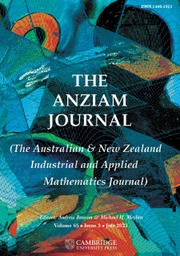Crossref Citations
This article has been cited by the following publications. This list is generated based on data provided by
Crossref.
Némethy, A.
1980.
On a finite element method for a certain class of time-dependent problems.
Numerical Functional Analysis and Optimization,
Vol. 2,
Issue. 5,
p.
331.
Craven, B.D.
and
Zlobec, S.
1980.
Complete characterization of optimality for convex programming in banach spaces†.
Applicable Analysis,
Vol. 11,
Issue. 1,
p.
61.
Craven, B.D.
1981.
Invex functions and constrained local minima.
Bulletin of the Australian Mathematical Society,
Vol. 24,
Issue. 3,
p.
357.
Chandra, S.
and
Husain, I.
1981.
Symmetric dual nondifferentiable programs.
Bulletin of the Australian Mathematical Society,
Vol. 24,
Issue. 2,
p.
295.
Kanniappan, P.
1984.
Duality theorems for convex programming without constraint qualification.
Journal of the Australian Mathematical Society. Series A. Pure Mathematics and Statistics,
Vol. 36,
Issue. 2,
p.
253.
Chandra, S.
Craven, B. D.
and
Husain, I.
1985.
Continuous programming containing arbitrary norms.
Journal of the Australian Mathematical Society. Series A. Pure Mathematics and Statistics,
Vol. 39,
Issue. 1,
p.
28.
Chandra, S
Craven, B.D
and
Husain, I
1985.
A class of nondifferentiable continuous programming problems.
Journal of Mathematical Analysis and Applications,
Vol. 107,
Issue. 1,
p.
122.
Zalmai, G.J.
1986.
Optimality conditions for a class of nondifferentiable minmax programming problems.
Optimization,
Vol. 17,
Issue. 4,
p.
453.
Craven, B. D.
1989.
A modified wolfe dual for weak vector minimization.
Numerical Functional Analysis and Optimization,
Vol. 10,
Issue. 9-10,
p.
899.
Khan, Zulfiqar Ali
1991.
On Nondifferentiable Quasiconvex Programming Problem.
Journal of Information and Optimization Sciences,
Vol. 12,
Issue. 1,
p.
57.
Zalmai, C. J.
1994.
Optimality conditions and duality models for a class of nonsmooth constrained fractional variational problems.
Optimization,
Vol. 30,
Issue. 1,
p.
15.
Craven, B. D.
and
Luu, D. V.
1994.
Constrained minimax for a vector-valued function.
Optimization,
Vol. 31,
Issue. 3,
p.
199.
AHMAD, I.
and
HUSAIN, Z.
2005.
NONDIFFERENTIABLE SECOND-ORDER SYMMETRIC DUALITY.
Asia-Pacific Journal of Operational Research,
Vol. 22,
Issue. 01,
p.
19.
Ahmad, Izhar
and
Gulati, T. R.
2006.
Mixed symmetric duality for nondifferentiable programming problems.
OPSEARCH,
Vol. 43,
Issue. 3,
p.
296.
GULATI, T. R.
and
GUPTA, S. K.
2007.
A NOTE ON MOND-WEIR TYPE SECOND-ORDER SYMMETRIC DUALITY.
Asia-Pacific Journal of Operational Research,
Vol. 24,
Issue. 05,
p.
737.
Scholz, Daniel
2013.
Geometric branch-and-bound methods for constrained global optimization problems.
Journal of Global Optimization,
Vol. 57,
Issue. 3,
p.
771.


